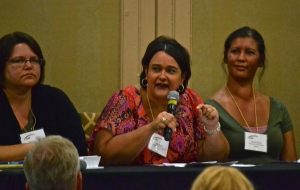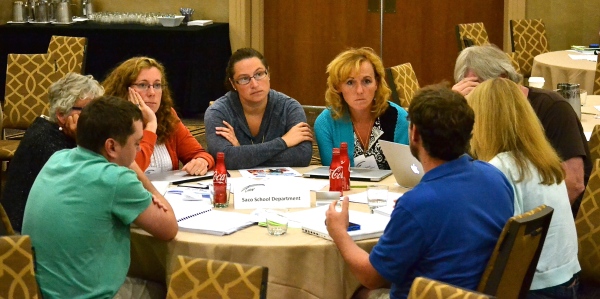InterACT: Why TURN?

Teacher leaders from Washoe Co. School District (NV) discuss their work at TURN Conference in Chicago (7/28/14, photo by the author)
For the past couple of years, I’ve been connected with the Teacher Union Reform Network (TURN), primarily through its affiliated regional network in California, CalTURN. On the occasion of my most recent TURN experience (in Chicago the past few days), and also due to some questions and criticisms surfacing in social media lately, I’ve decided to write a bit about why I participate in TURN, and how I think it contributes to strengthening unions, the teaching profession, and public education.
Before I go into the details, let me establish some basic points:
- I strongly believe in collective bargaining, and have found TURN entirely committed to strong unions using collective bargaining to improve teaching and learning.
- I also believe our unions must address labor issues, the professionalization of teaching, and social justice; I have always found TURN leadership and participants share those values.
- I am an advocate of expanding teacher leadership as part of every phase of school and district governance, and have been engaged with TURN because it is helping this to happen within a strong union framework.
- I want to pursue expanded career pathways for teachers, formalizing new roles in educational systems, allowing us to exert greater influence on curriculum, professional development, and school improvement; I have consistently found TURN supporting those ideas.
These were my beliefs before I found TURN. If I didn’t think TURN was supportive of these principles, I wouldn’t be involved. My allegiance to these principles supersedes my commitment to any organization, and I hope this blog post (along with others if anyone really wants to dig into it) will help clarify where I’m coming from, and what motivates me and others with whom I’ve shared this work.
My awareness of TURN goes back several years, but my own involvement began shortly after I worked with a group of educators in Accomplished California Teachers to help produce a policy report on teacher evaluation. I was invited to present that work at a CalTURN conference in Santa Monica, and found the group was engaging in some interesting work around labor-management collaboration and interest-based bargaining. There were district teams attending the meeting with both union and administrative leaders, working together, taking time to find common ground, wrestle with challenges, and learn from other unions and administrators at the conference. The conversations in the room were productive, and consistently focused on helping teachers do a better job of helping students learn more effectively.
In my own district, I had always seen a spirit of cooperation and good will among union leaders and administrators. Again, it’s not perfect – but it wasn’t divisive or vitriolic. In my twelve years there, we’ve gone through a few variations on teacher evaluation and professional development, conversations and work in which I had a little more insight and input, and I have seen how a district’s positive working relationship contributes to better teaching and learning. Though my district has not participated in CalTURN in the time that I have started to, I stayed involved on my own, and was eventually invited to participate on the steering committee (though, please note, I do not speak for CalTURN or anyone else on the steering committee). I’ve written about CalTURN in prior blog posts for those who want more insights into the conferences I’ve attended, and what they accomplished.
This week was my first time attending a TURN conference drawing attendees from around the country. Again, I saw labor-management teams attending together, and importantly, working together, having substantive conversations about how to to do better work for our students. There are TURN-affiliated districts around the country, representing tens of thousands, perhaps hundreds of thousands of teachers.

Labor and management at the table, planning future collaboration. (TURN, Chicago, 7/29/14, photo by the author)
The recent tensions on social media, I think, are largely arising because the conference focused on Common Core implementation. Putting those three words together pretty much ends the debate before it starts for some people, and I started seeing critical posts on Twitter, Facebook, and blogs. The argument is that helping implement Common Core is helping corporatize and privatize public education. By implication, the critics seem to argue that any union member or local association that is implementing the common core is selling out. They do not seem to accept that many of our union brothers and sisters look at the same information and reach different conclusions about the implications of that information, or the best course of action. My approach is to accept that my fellow professionals, and our associations in various states and in various political circumstances, can be trusted to determine their own priorities and directions on a variety of complicated issues in challenging times.
TURN is addressing Common Core implementation because that’s what member associations and districts are doing, some enthusiastically, some still expressing varying degrees of concern. TURN is not in the position of telling anyone to implement CCSS, but rather, meeting the needs of members that are going through that transition. The overarching goal is to ensure that teachers, through their unions, have the ability to negotiate policies and collaborate in decision-making to improve teaching and learning.
In the past few days, I heard presenters consistently describing ways in which labor-management collaboration and union advocacy have created new professional development and leadership opportunities for teachers. I heard about districts making policy changes that entrust teachers – and unions – with new roles and greater responsibility. These are concrete gains, solid improvements in the profession. As the assessment and accountability landscape evolves, I believe we are now in a better position to influence policy improvements. I do wish more of this progress had come without CCSS in the picture, but my hope now is that teachers and unions will protect these gains, ensuring the continued improvement of teaching in their districts. If we do that, we’ll have stronger unions, better teaching, and lasting improvements that will persist through the inevitable transition through CCSS to the Next Big Thing, whenever that might occur.
I do understand the concerns around Common Core. I’ve been critical of the Common Core in the past, especially the processes by which they were crafted and adopted, and this blog has featured posts (mine and others’) critical of CCSS. I’m deeply concerned that the assessments will be abused the same way that testing was abused under NCLB. I’ve also previously written about why I am not actively resisting Common Core in my context at this time, though I remain vigilant to see what will happen in the future, and remain engaged to try to prevent outcomes such as the misuse of test scores for teacher evaluation. If I were teaching in New York, I’m sure I’d be taking a different approach, and I may yet in California. The fact that at times I’ve been a member or leader connected to any organization – my local union, CTA, TURN, NBPTS, NCTE, ASCD, Learning Forward, etc. – does not mean I automatically subscribe to all of their positions and agree with all of their policies. That’s partly why I engage – not only to support what I think is good work by good organizations, but also to try to influence their work and make it better.
That approach won’t appeal to everyone. So be it. But the critics win no converts by implying that any thinking, informed person who shares their core values regarding schools must also share their opinions about the One True Path to help schools. It’s implied we are supposed to avoid or resist anything connected at all with the Common Core, or the Gates Foundation, or Pearson… you get the idea. I fully understand the criticisms of those entities; I agree on many points, have made many of those same points myself at times, and I’m glad that there is a vigorous debate around the issues. But if you reject everything and everyone connected even tangentially to the largest initiatives, largest vendors, and largest funders in education, you don’t have much to work with.
So, instead of engaging in an ideological battle that divides everyone into one camp or the other, I’m finding ways to do the most productive work I can, guided by the principles outlined above, to help students, teachers, and public schools.
This blog post has been shared by permission from the author.
Readers wishing to comment on the content are encouraged to do so via the link to the original post.
Find the original post here:
The views expressed by the blogger are not necessarily those of NEPC.
